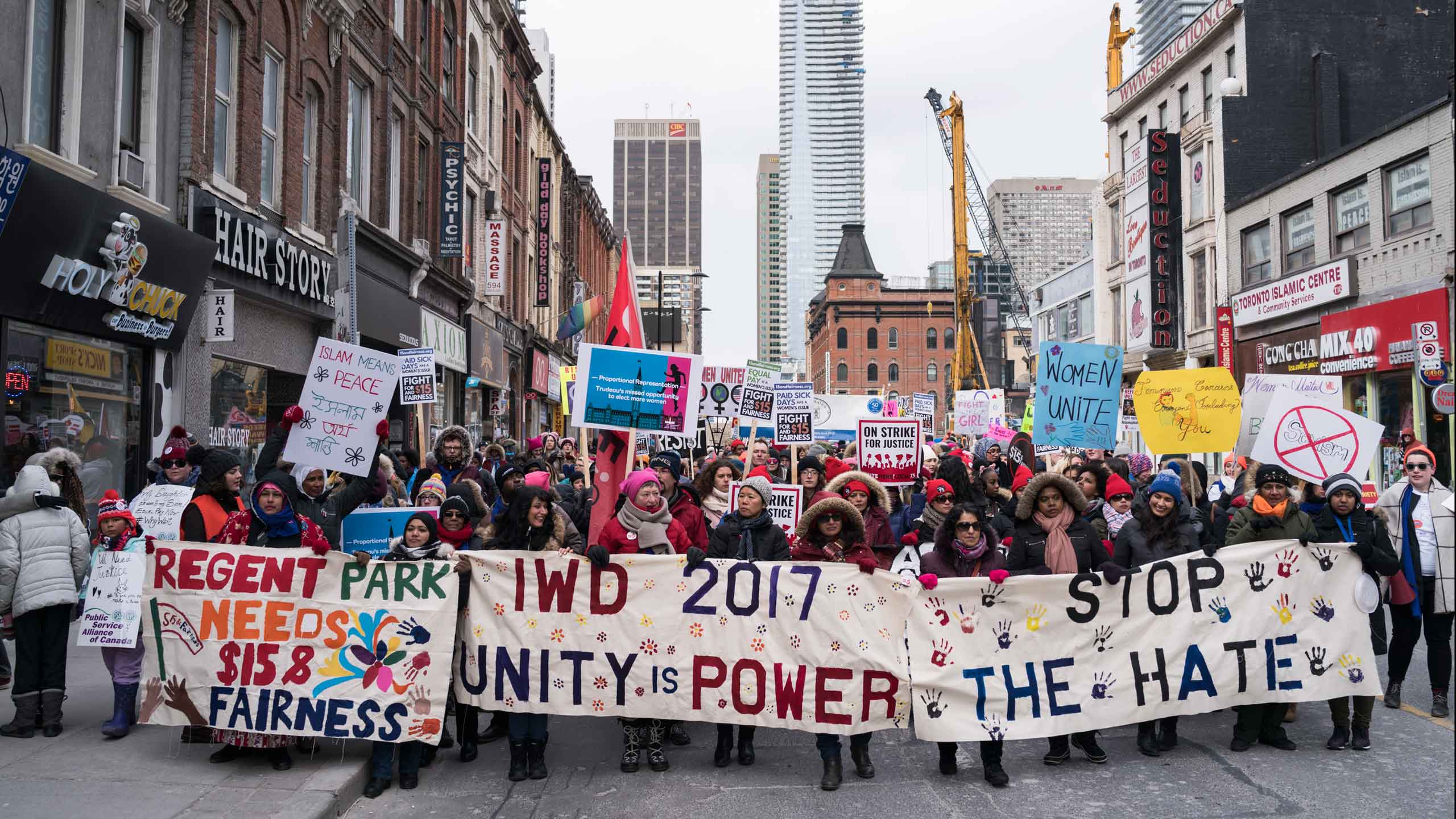By Zahraa Hmood
The International Women’s Day March (IWD) on March 11 saw hundreds of people gathered together, marching the streets of Toronto. The march ended inside Ryerson University’s Student Learning Centre, where the annual International Women’s Day Fair was taking place. Various booths from different organizations supporting IWD were present. At around 2 p.m. the lobby quickly filled with many people from the march.
This is one of several marches that have taken place this year in Toronto, including the Women’s March on Washington – Toronto, a solidarity event with the women’s march in Washington, D.C., in response to the election of U.S. President Donald Trump.
This fair was organized by the Centre for Women and Trans People from the Equity Service Centres of the Ryerson Students’ Union. Hannah Reaburn from the Centre spoke about the state of equity for women and other marginalized individuals on campus.
“There’s a lot of improvement that can be made,” she said. “There’s not enough support from the students’ union, there’s not enough support from the university itself in terms of making those making those really necessary changes happen as well.”
[ngg_images source=”galleries” container_ids=”329″ display_type=”photocrati-nextgen_basic_thumbnails” override_thumbnail_settings=”0″ thumbnail_width=”100″ thumbnail_height=”75″ thumbnail_crop=”1″ images_per_page=”20″ number_of_columns=”0″ ajax_pagination=”0″ show_all_in_lightbox=”0″ use_imagebrowser_effect=”0″ show_slideshow_link=”1″ slideshow_link_text=”[Show as slideshow]” order_by=”sortorder” order_direction=”ASC” returns=”included” maximum_entity_count=”500″]Reaburn pointed to recent pro-life or “anti-choice” protestors on campus. A group of individuals touting signs discouraging people from getting abortions. They have been met on more than one occasion with pro-choice counter-protesters. “The university just hasn’t been doing what it should be doing to protect students.”
The Wednesday of International Women’s Day saw a demonstration outside President Mohamed Lachemi’s office calling for action. The Ryerson Reproductive Justice Collective organized this demonstration, for which Reaburn was present.
Upcoming Ryerson Students’ Union Vice President of Equity Camryn Harlick helped organize the International Women’s Day fair and was there on Saturday. They talked about their thoughts on activism at Ryerson.
“I think Ryerson students are doing an amazing job. Student activism is something that has existed for a really long time at Ryerson,” Harlick said, adding that it was “the driving force behind why I came here.” However, they added that “I think the university as an institution still has a really long way to come.”
One example of this was their work with the Ryerson Reproductive Justice Collective (RRJC): “We had meetings to meet with President Lachemi three times and he didn’t attend any of those meetings.” Harlick said that sent in his place was either a woman, “which is slightly misogynistic,” or two individuals who engaged in a debate on the issue.
“We’re not looking to have a debate: we’re looking to have a dialogue about how Ryerson can be more equitable,” Harlick said.
Some of this lack of support from administration was demonstrated to Harlick, they said, at the RRJC’s town hall meeting on February 13th, which President Lachemi attended. “Heather Lane Vetere said she wasn’t willing to risk her job to make sure equity is happening on campus. We risk our jobs every day,” they said. “That’s not an excuse anymore.”
Overall, Harlick said we need to push Ryerson’s faculty to do better, including through mandatory equity training for professors across all faculties. “We’ve seen issues with Ryerson professors and equity recently with some big names on campus,” they said. “I think that it’s important professors know what’s at stake for them and why they should be supporting their students.”
The 2016-2017 VP Equity Tamara Jones ran on this political goal in her platform during the last RSU elections. She spoke about some of the issues she personally dealt with these past two semesters in increasing equity on campus for marginalized individuals.
For Jones, however, there are some issues of a lack of inclusivity in some recent advocacy efforts, such as the Women’s March on Washington in Toronto. “I didn’t really feel myself reflected in that. I think that’s a really common problem with racialized women, queer women, trans folks: everyone just feels like not included at times.”
Harlick said they have two goals in mind for when they assume the position of VP Equity this fall 2017: increasing and bettering accessibility on campus, and furthering Indigenous rights. This would include an Indigenous healer in the Wellness Centre or Counselling Centre, and mandatory land acknowledgements at all campus events.













Leave a Reply